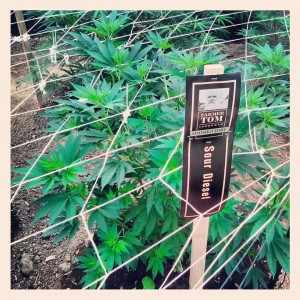What happens to small medical growers?
There’s a lot of gray area when it comes to Washington’s medical marijuana collectives. And it will be another year before they learn whether they’ll have to merge into the recreational economy.
Farmer Tom Lauerman, who often goes by “Farmer Tom,” has had a medical marijuana collective garden in Vancouver, right on the border with Brush Prairie, for about 10 years.

Like many small farmers, he didn’t have the money to go for a I-502 growers license, since beyond the $1,000 license fee he also couldn’t afford to set up the sort of facility and security the law requires for recreational growers, which likely would have run upwards of $60,000, he said.
“When I-502 came around, I couldn’t afford all the fees,” he said.
Beyond pot, Lauerman also has a community supported agriculture agreement with several neighbors, where he grows and distributes a variety of fruits and vegetables.
But even with the collective garden and the CSA, he still struggles for the cash to keep things running, and so a commercial grower’s license remains well out of reach.
But when it comes to keeping his farm going after I-502, Lauerman has another idea.
He wants to join forces with one of Clark County’s licensed recreational growers (at least once we have more than one) – so instead of going for a license he’s working on marketing his product line to those that do.
“The way we grow our vegetables is exactly how we grow our cannabis,” Lauerman said. “We grow for taste, flavor, aroma. People aren’t just looking to get high, they’re looking for flavor and a better overall experience. And plants grown outdoors just taste better than plants grown indoors in a sealed facility.”
He’s already had a handful of licensees from around the state ask him for growing advice. Several have never grown marijuana before, he said.
The trick is finding one locally that wants to work with him, he added.
“We’re ready to make the move,” Lauerman said. “We’re just small farmers out there wanting to shift into the industry.”
He’s also branched out with a tour company, Seattle’s Kush Tourism, to bring groups through his farm so they can check out his operations. (The Oregonian has a story about that here: Washington medical marijuana grower opens farm to tours)
“It’s really about marketing,” Lauerman said. “It doesn’t bring in a whole lot of money.”
And he’s working with local artist George Leon to create hats and T-shirts and some branding with Farmer Tom’s Cannabis Trading Cards.
Lauerman has a line of cannabis products including tinctures, essential oils and buds.
Still, he also has to worry about his own income and supporting his family. And if he has to stop farming because laws shift everything to commercial production, he may have to stop farming all together, he said.
“We have a year to figure it out,” Lauerman said. “But I’m hoping I’ll get that phone call and it will all work out.”



